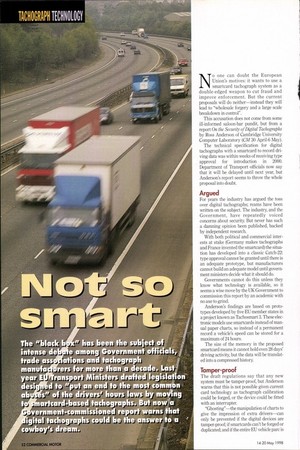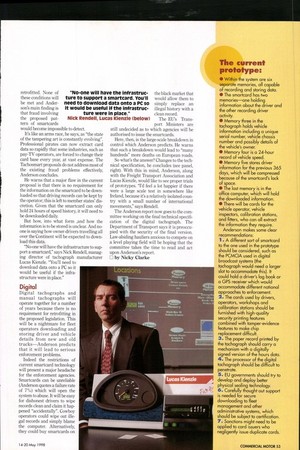"has been the subject of e among Government officials, ations
Page 64

Page 65

If you've noticed an error in this article please click here to report it so we can fix it.
and tachograph rers for more than a decade. Last rans ort Ministers drafted legislation ut an end to the most common drivers' hours laws by moving artcard-based tachographs. But now a • vernment-commi sio d report warns that igital tachograp.L he answer to a The "black intense de trade ass manufa year desi ab \ o one can doubt the European Union's motives: it wants to use a , smartcard tachograph system as a double-edged weapon to cut fraud and improve enforcement. But the current proposals will do neither—instead they will lead to "wholesale forgery and a large scale breakdown in control".
This accusation does not come from some ill-informed saloon-bar pundit, but from a report On the Security of Digital Tachographs by Ross Anderson of Cambridge University Computer Laboratory (CM 30 April-6 May).
The technical specification for digital tachographs with a smartcard to record driving data was within weeks of receiving type approval for introduction in 2000. Department of Transport officials now say that it will be delayed until next year, but Anderson's report seems to throw the whole proposal into doubt.
Argued For years the industry has argued the toss over digital tachographs; reams have been written on the subject. The industry, and the Government, have repeatedly voiced concerns about security. But never has such a damning opinion been published, backed by independent research.
With both political and commercial interests at stake (Germany makes tachographs and France invented the smartcard) the situation has developed into a classic Catch-22: type approval cannot be granted until there is an adequate prototype, but manufacturers cannot build an adequate model until government ministers decide what it should do.
Governments cannot do this unless they know what technology is available, so it seems a wise move by the UK Government to commission this report by an academic with no axe to grind.
Anderson's findings are based on prototypes developed by five EU member states in a project known as Tachosmart 3. These electronic models use smartcards instead of manual paper charts, so instead of a permanent record a vehicle's speed can be stored for a maximum of 24 hours.
The size of the memory in the proposed smartcard means it cannot hold even 28 days' driving activity, but the data will be translated into a compressed history.
Tamper-proof The draft regulations say that any new system must be tamper-proof, but Anderson warns that this is not possible given current card technology as tachograph calibration could be forged, or the device could be fitted with an interrupter.
"Ghosting"—the manipulation of charts to give the impression of extra drivers—can only be prevented if the digital devices are tamper-proof; if smartcards can't be forged or duplicated; and if the entire EU vehicle parc is retrofitted. None of these conditions will be met and Anderson's main finding is that fraud involving the proposed pattern of smartcards would become impossible to detect It's like an arms race, he says; as "the state of the tampering art is constantly evolving". Professional pirates can now extract card data so rapidly that some industries, such as pay-TV operators, are forced to change their card base every year, at vast expense. The Tachosmart proposals do not address most of the existing fraud problems effectively, Anderson concludes.
He warns that a major flaw in the current proposal is that there is no requirement for the information on the smartcard to be downloaded so that driving records can be kept by the operator; this is left to member states' discretion. Given that the smartcard can only hold 24 hours of speed history, it will need to be downloaded daily.
But how, into what form ,and how the information is to be stored is unclear. And noone is saying how owner-drivers travelling all over the Continent will be expected to download this data.
"No-one will have the infrastructure to support a smartcard," says Nick Rendell, managing director of tachograph manufacturer Lucas Kienzle. "You'll need to download data onto a PC so it would be useful if the infrastructure were in place."
Digital Digital tachographs and manual tachographs will operate together for a number of years because there is no requirement for retrofitting in the proposed legislation. This will be a nightmare for fleet operators downloading and storing driver and vehicle details from new and old trucks—Anderson predicts that it will lead to serious enforcement problems.
Indeed the restrictions of current smartcard technology will present a major headache for the enforcement agencies. Smartcards can be unreliable (Anderson quotes a failure rate of 7%) which will open the system to abuse. It will be easy for dishonest drivers to wipe records clean and claim it happened "accidentally". Cowboy operators could wipe out illegal records and simply blame the computer. Alternatively, they could buy smartcards on the black market that would allow them to simply replace an illegal history with a clean record.
The EU's Transport Ministers are still undecided as to which agencies will be authorised to issue the smartcards.
Here, then, is the large-scale breakdown in control which Anderson predicts. He warns that such a breakdown would lead to "many hundreds" more deaths on European roads.
So what's the answer? Changes to the technical specification, he concludes (see panel, right). With this in mind, Anderson, along with the Freight Transport Association and Lucas Kienzle, would like to see proper trials of prototypes. "I'd feel a lot happier if there were a large scale test in somewhere like Ireland, because it's a relatively isolated country with a small number of international movements," says Rendell.
The Anderson report now goes to the committee working on the final technical specification of the digital tachograph. The Department of Transport says it is preoccupied with the security of the final version. Law-abiding hauliers anxious to compete on a level playing field will be hoping that the committee takes the time to read and act upon Anderson's report by Nicky Clarke




































































































































